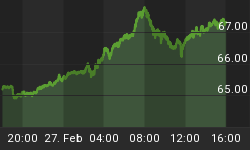The bond market continues to worry, while the stock market continues to be bored by the whole lead-in to the election and Fed policy meeting next week. (The equity market traded lower in the morning but ended the day off a scant -0.3%.)
Bond investors are preoccupied with QE2, clearly. The Treasury market suffered a setback overnight on the basis of a Wall Street Journal article entitled "Fed Gears Up for Stimulus," by Jon Hilsenrath. Hilsenrath is supposed by some people to be the current Fed 'mouthpiece' by which market expectations are adjusted while retaining plausible deniability for the Fed. In the article, citing no one (and thus doubly suspect for the specificity of the speculation), Hilsenrath states:
"The central bank is likely to unveil a program of U.S. Treasury bond purchases worth a few hundred billion dollars over several months, a measured approach in contrast to purchases of nearly $2 trillion it unveiled during the financial crisis."
Investors, based on the reaction of the bond market, expect more than "a few hundred billion," although the article did not suggest that amount "over several months" would be the sum total of the operation. Indeed, it is generally supposed that more than $100bln a month would be difficult operationally for the Fed, so such a pace is pretty close to full-throttle for QE2. I suspect that what was being run up the flagpole was the wording of the announcement, and whether the Committee should highlight just the near-term plan or whether it is necessary to allude to continuing purchases in the future. I suspect the answer will be the latter.
The worries about a less-dramatic-than-expected QE2 apparently trumped, for bond investors, the possible renewal (already) of the Greek tragedy. Greece's Finance Minister said today (story here) that tax revenues have been falling short, and so the budget shortfall will be above 15%...quite a bit more than Prime Minister Papandreou suggested it would be as recently as October 7th. Greek bonds got whacked, along with other European bonds. Golly, we thought that the ECB's rescue would buy more than a couple months of peace!
While the Greek news helped the dollar (as did, probably, the speculation of smaller QE2), it didn't boost Treasuries as much as one would have thought. Bonds also seemed indifferent to the weak Durables number. Durables ex-Transportation was -0.8% versus expectations for +0.5%, which means that core Durables actually declined over Q3, and Nondefense Capital Goods Orders ex-Aircraft fell an annualized 5.5% during the quarter. Shipments of nondefense capital goods still rose, so this will not much drag on Q3 GDP, but the outright decline in orders is a bad sign for future quarters and another indication that the post-Lehman bounce has run its course.
In other news, even without QE2 we got an inflation bump: the Metropolitan Transit Authority in NY announced that bridge and tunnel tolls will rise 7.5% on December 30th. This follows increases in train fares several months ago. While stochastic increases in tax rates and fees are not technically inflation (because they are not automatically repeated), they do raise the price level and so are beneficial to those holding indexed bonds.
Today, though, indexed bonds took a beating. The nominal 10y yield rose to 2.71%, but TIPS yields rose more than nominal yields rose, so inflation breakevens and inflation swaps declined 3-5bps. Some of this may be hangover from the 5y TIPS auction, but I suspect most of it is profit-taking in long-TIPS and long-inflation positions from much sweeter levels - taking chips off the table before QE2 especially if Hilsenrath is right and it will be underwhelming.
Fortunately, we are down to a blessed few days before we will get resolution to the two major uncertainties facing investors: the election and the Fed meeting. Not surprisingly, implied volatilities have risen for the last couple of days, and today the VIX peeked over 22 after starting the week at 18.78. After these two events pass, I would expect to see the VIX decline - unless there is a major market-affecting surprise from one of those two events.
On Thursday the only data is Initial Claims (Consensus: 455k vs 452k last week). There is not much to say about that. There is also the last auction of government duration prior to the big events, as the Treasury looks to unload $29bln of 7y notes. Even as investors are cutting positions, I would think the auction goes well simply because the issue is some 25bps cheaper than it was a couple of weeks ago. But I would think that dealers presently will be fairly interested in distributing the risk quickly, and a good auction may be met with selling.















